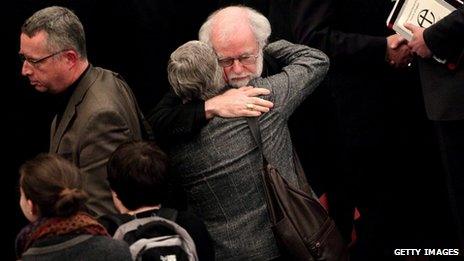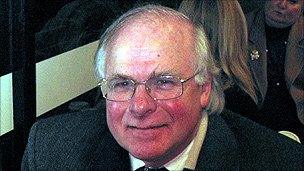Women bishops: Ordinary churchgoers could shape CofE's future
- Published

The vote against women bishops shocked many of their supporters
Supporters of women bishops in the Church of England have called on churchgoers to organise and push through the policy in the form they want, in the church's next General Synod in 2015.
They believe they have been outflanked by their well-organised opponents, who succeeded in scuppering the move to ordain woman as bishops in last month's General Synod.
Now they plan to fight back, by mobilising ordinary church members on their behalf, in a bid to push through a "single-clause measure" stating simply that women can be bishops, without any concessions in the law to cater for their opponents.
But how practical is this call, and can lay members really affect policy on important and controversial issues?
Both sides in the debate clearly believe they can - especially after the move to allow women bishops was defeated after not enough lay members in the Synod voted for the change.
The policy needed the support of two-thirds of each of the Synod's Houses to get through.
But while more than two-thirds of the members of the Houses of Bishops and Clergy supported the policy, it failed in the House of Laity, where 132 lay representatives voted for women bishops - but 74 voted against.
Those who voted against insist that they were not trying to block women bishops' appointment.
They were trying to stop a law which did not guarantee their own place in the Church.
They want any law which passes to allow stand-in bishops appointed to look after them to have sufficient independent authority.
Outflanked in elections
Last month's result emphasised the power of of the House of Laity, and led to a call to action by a prominent leader of the campaign to ordain women bishops.
Campaigners for the Women and the Church group (Watch) say opponents of women bishops ran a well-organised campaign to get more of their supporters into the House of Laity.
Now Watch is calling on ordinary churchgoers to register themselves as voters on parish electoral rolls, and play a part in electing a House Of Laity that will push through a change in the church rules in 2015 - the next General Synod.

Supporters of women bishops did not realise the imporetance of the elections, says Hugh Lee
They believe the vast majority of ordinary churchgoers are in favour of women bishops, and that the vote in the House of Laity did not reflect true opinion.
Said Watch's Rachel Weir - said: "You can feel the energy out there - and the outrage - at what's happened."
The Reverend Hugh Lee, Watch's co-ordinator in the General Synod said: "We assumed, wrongly, the laity vote on women bishops would go our way.
"After all, we have women priests, and we thought that women bishops would be just as acceptable to lay members.
"But in the 2010 elections our opponents knew that women bishops would be an issue, and they mobilised their forces and got their candidates standing.
Our supporters - the silent majority - did not realise the need to take these elections so seriously."
Evidence for Mr Lee's assessment of the commitment of his opponents can be found on the website of the conservative evangelical group Reform, external which says that 31 of its members were elected during the 2010 General Synod elections, and describes the figure as "a significant increase".
But Watch accuses its opponents of not merely running a co-ordinated election strategy but, more seriously, of concealing their opposition to women bishops in candidates' election statements.
Mr Lee said: "A lot of the time what they said was not explicit. A candidate's election statement might say: 'I'm in favour of women's ministry", which you might take to be supportive of women bishops, but in reality could be women running the Sunday school, for instance."
Intensely political
Casual observers of the general synod - which makes Church of England policy - might be forgiven for not viewing it as a political body.
In practice, the synod is intensely political, with rival factions organising in favour and against important changes - such as women bishops, or same sex-marriage.
It is thought supporters of women bishops failed largely because they were opposed by a well-organised alliance of two quite different groups within the House of Laity: conservative evangelicals represented by the Reform group; and Anglo-Catholics with a traditional view of how the church should operate.
Martin Dales, of the Catholic Group in General Synod, voted against women bishops, and accepts that some of the failure of the "pro" faction could be attributed to the 2010 Synod elections which he acknowledged returned a more "conservative" group of representatives to the House of Laity.
He explained why his group made an alliance with evangelicals: "Sometimes you do make common cause when you find ourselves desirous of getting the same end - in this case a rejection of women bishops.
"We both believed that the church position on women, which had been the same for centuries, needed to be upheld."
He rejected accusations by supporters of women bishops that a well-organised campaign had skewed representation in the House of Laity, which he insisted reflected opinion in the church as a whole.
In particular he quoted a poll by the Bible Society, external which suggested a quarter of churchgoers were opposed to women bishops. He said this was reflected in the opinion of House of Laity.
The fact that more than a quarter of the House voted against was accounted for by lay members who supported women bishops, but did not wish to split the Church, he said.
The poll's methodology is questioned by some of those who support women bishops.
Split the church
Mr Dales also dismissed accusations that a clever election campaign in 2010 had inserted the right people into the House of Laity, and that some of those elected had hidden their opposition to women bishops:
"Honestly, this was not just a group of conservatives and evangelicals who opposed women bishops.
"There were a lot of people who supported women bishops, but voted against them because they didn't want to split the church.
"And I reject the accusation that our candidates concealed their position. People don't necessarily write their election address in the same way - you don't necessarily mention particular issues. and there is no three-line whip on what you do and don't say."
Whatever the outcome at the next General Synod, it seems clear that ordinary churchgoers will play a significant part in whether the church will make fundamental changes to the way it is run, with many predicting a damaging and permanent split if supporters of women bishops finally get their way.
Both supporters and opponents view the elections to the local synods in the Church's 718 deaneries in spring 2014 as the next key date.
Watch campaigner Hugh Lee said the first step would be to encourage people to get on their church electoral rolls - because the numbers on these rolls determined how many representatives a parish had on the deanery synods.
A Church of England spokesperson told the BBC: "We have always encouraged parishioners to play a proper part in every aspect of parish life where their gifts will make a difference - whether or not they are members of the electoral roll."